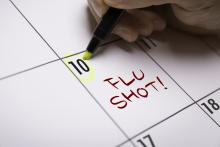Flu Prevention
Don't let the flu stop you.
Get your flu vaccine today!
Personal protection
The best way to protect yourself and those you love from getting sick from the flu is to get a yearly flu vaccine.
Other steps like washing your hands, avoiding others when sick, and covering your nose and mouth when you sneeze and cough can slow the spread of the flu.
See below for actions you can take to protect yourself and others from the flu.
Why should I get the flu vaccine?
The best way to protect yourself and the people around you from the flu is to get the flu vaccine every year in the fall.
Even if you typically don't get sick, getting vaccinated will stop you from spreading it to others at higher risk of getting hospitalized or dying from the flu.
Help us keep you and your families healthy.
Make sure that everyone who is older than 6 months gets their flu vaccine.
This year, COVID-19, RSV, and other respiratory illnesses are spreading as well as the flu. Get the best protection against COVID-19 and the flu by getting your COVID-19 vaccine boosters and yearly flu vaccine. Learn more about the COVID-19 vaccine.
Where can I get the flu vaccine?
You can call your doctor, pharmacy, or check out your local or tribal health department’s website to find a flu vaccinator near you.
Wisconsinites’ high demand for flu vaccine in some places may mean that some vaccinators run out of vaccine supply before their next shipment arrives.
To make sure your vaccinator has vaccine available, please call ahead.
- There may also be more than one location in your area that has vaccine available.
- If you have health insurance, it is best to call your insurance company to ask where you can get your flu vaccine and verify any costs.
- Children who aren't covered under health insurance can get free vaccines through the Vaccines for Children Program (VFC). Find a VFC provider, P-02450 (PDF) in your city and call ahead to make a flu vaccine appointment for your child.
Across our state, Wisconsin communities are working hard to make it easy for you to protect yourself and other from the flu. Find a flu vaccinator near you.
When is the best time to get the flu vaccine?
Since it takes about two weeks after getting the vaccine for your body to build up defenses against flu infection, the CDC (Centers for Disease Control and Prevention) and Wisconsin Department of Health Services (DHS) recommend that everybody age 6 months and older get a flu vaccine in the fall or early winter.
It is best to protect yourself and the people around you before the flu starts to spread in your community.
But if you aren’t able to get your vaccine by the fall, please still get vaccinated because the vaccine can protect you for the rest of the winter and spring.
Remember that you can get the flu vaccine at the same time as other vaccines, including the COVID-19 vaccine, whether it’s your first or second dose, or a booster.
What are the different types of vaccines?
Flu vaccines protect against the four viruses that research suggests will be most common in that particular flu season.
This season, all flu vaccines are quadrivalent, meaning they protect against four different viruses (including two influenza A viruses and two B viruses). There are three flu vaccines that are now preferentially recommended for people 65 years and older. If none of the three flu vaccines recommended for people 65 years and older is available, people in this age group should get any other age-appropriate flu vaccine instead. Please take advantage of the available flu vaccine, rather than staying unprotected against the flu while waiting for a specific vaccine. Egg-free (quadrivalent recombinant and cell-based vaccines) and needle-free options (FluMist nasal spray) are available as well. Talk with a doctor or pharmacist about which vaccine is the best choice for you.
View the pediatric and adult influenza vaccine product and dosing list for more information about available vaccines. Please note, some of the products listed may not be available through the Wisconsin Vaccines for Children program. Have a question? Let us know by sending an email to vfc@dhs.wisconsin.gov.
Who is at higher risk of having serious complications due to the flu?
- Young children
- People who are pregnant
- People 65 years of age and older
- People with chronic health conditions, such as asthma or heart disease
Although it is especially important that people in these groups get vaccinated to decrease their risk of severe flu illness, it is very important that healthy people ages 5 to 64 years old get vaccinated too, since they are most likely to spread influenza and can still get complications from flu.
Children under the age of 6 months are too young to be vaccinated, but are at a high risk of serious flu illness. It is important that people who live with or care for infants, as well as anyone who is at a higher risk of flu complications, get the flu vaccine every year to prevent spreading the flu to them.
If you do become sick with the flu, there are steps you can take to make sure you don't spread your illness to others
- If possible, stay home when you are sick, and only go out for medical care or for other necessities. CDC recommends staying home for at least 24 hours after your fever is gone without using fever-reducing medicine.
- Wash your hands often with soap and warm water for 20 seconds, or with an alcohol-based hand sanitizer if soap and water are not available.
- Cover your mouth and nose with a tissue when you cough or sneeze, and throw the tissue in the trash after you use it.
Antiviral drugs may be prescribed by your doctor if you have the flu. Many people do not need antivirals to recover from the flu, but they can be used to make the illness milder and shorten the time you are sick. They may also help to prevent serious flu complications, such as pneumonia.
Antiviral drugs are not antibiotics. Antivirals work best when they are started within two days of getting sick. Starting antivirals later than this can still be helpful, especially if you are at a high risk of developing severe flu illness, or are very sick from the flu.
Resources
- Weekly Respiratory Virus Surveillance Report, P-02346: Weekly report that includes trends of respiratory viruses and influenza vaccination information.
- Flu fact sheet, P-42064 (multiple languages): Educational fact sheet for the general public on the flu covering signs and symptoms, diagnosis, and prevention
- Is it the flu, a cold, or whooping cough?, P-02263 (multiple languages): Flyer outlining the differences between the flu, a cold, and whooping cough
- Wash Your Hands!, P-01710 (multiple languages): Flyer with instructions on how to properly wash hands
- Handwashing fact sheet, P-42052 (multiple languages): Educational fact sheet for the general public about correct handwashing technique and how to prevent the spread of disease
- Who Can You Protect? Flyers encouraging flu vaccine for specific populations:
- Family, P-01984 (multiple languages)
- Infant, P-01984A (multiple languages)
- Pregnant Women, P-01984C (multiple languages)
- Seniors, P-01984B (multiple languages)
- Flyers on ways to protect yourself from the flu for specific populations:
- Promoting Influenza Vaccination 2022-23 Toolkits:
- Seasonal influenza webpage (Influenza webpage in Spanish): Main CDC website that contains comprehensive influenza information.
- Influenza educational resources
Questions about the flu? Contact us!
Phone: 608-267-9003 | Fax: 608-261-4976








